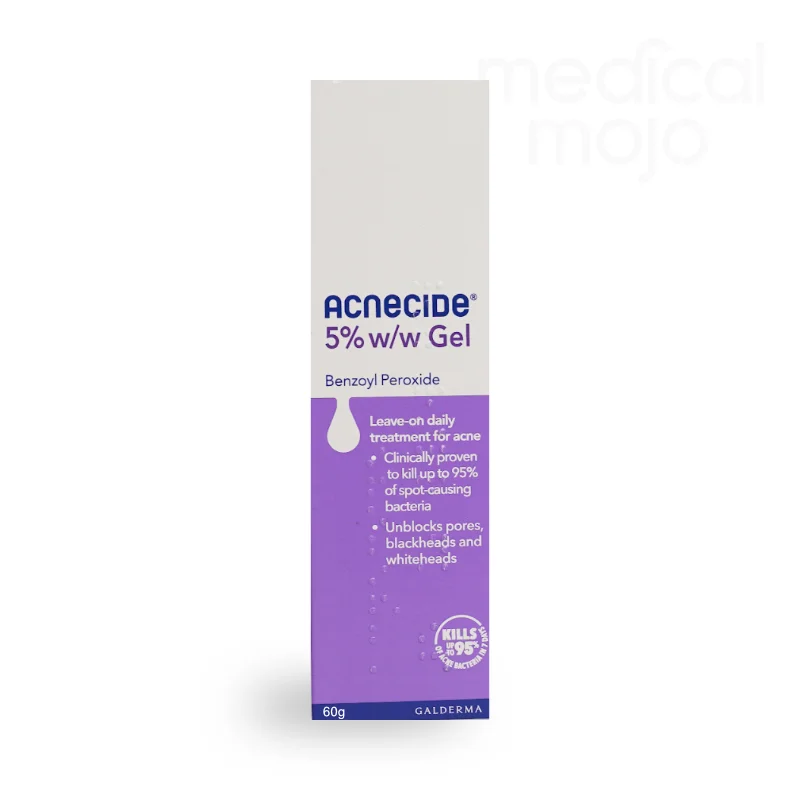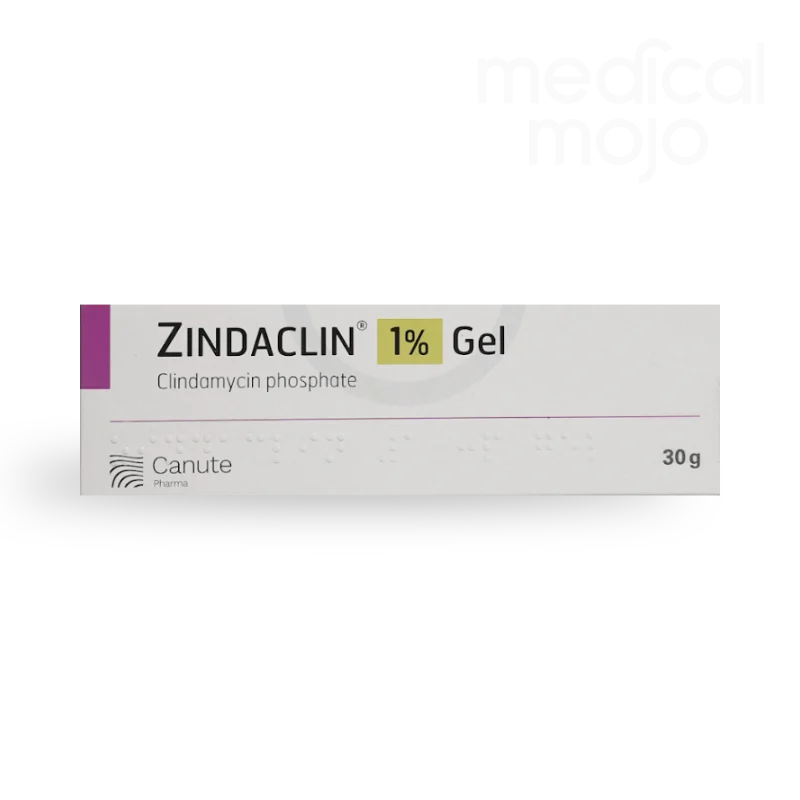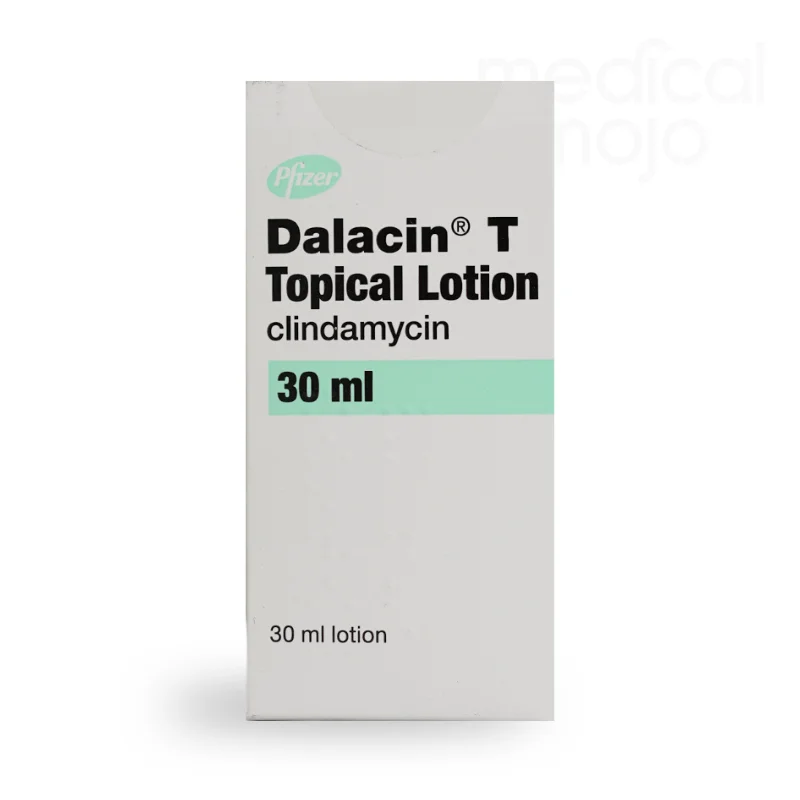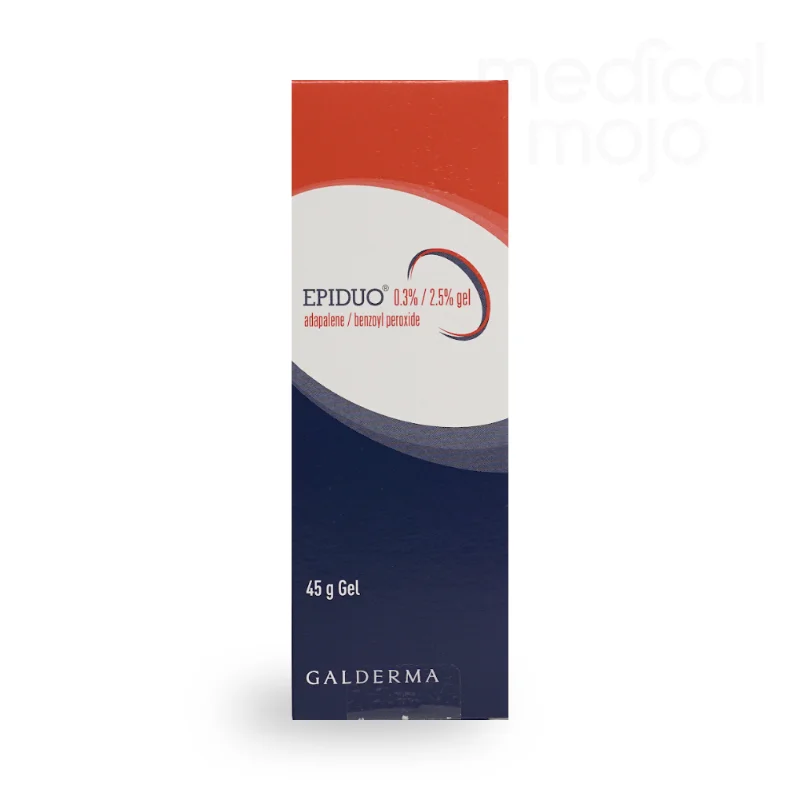What is Acnecide?
Acnecide contains the active ingredient benzoyl peroxide, which targets the bacteria known as Cutibacterium acnes, a primary cause of acne. This medication has been recommended by your doctor or pharmacist to treat acne, which typically appears as blackheads and whiteheads, commonly referred to as pimples or spots. Acnecide can be used to treat acne on the face, chest, or back.
How does Acnecide work?
Acnecide works by utilizing its active ingredient, benzoyl peroxide, which is a powerful antibacterial agent. Here's how it helps treat acne:
- Kills Acne-Causing Bacteria: Benzoyl peroxide targets and destroys Cutibacterium acnes (formerly known as Propionibacterium acnes), the bacteria responsible for causing acne. By reducing the bacterial population on the skin, it helps to prevent and treat the formation of new acne lesions.
- Unclogs Pores: Benzoyl peroxide also has a mild exfoliating effect, which helps to clear dead skin cells from the surface of the skin and unclog pores. This reduces the chances of blackheads and whiteheads forming.
- Reduces Inflammation: The antibacterial action of benzoyl peroxide helps to reduce inflammation associated with acne, leading to less redness and swelling around pimples.
By combining these effects, Acnecide helps to treat existing acne and prevent new breakouts, leading to clearer skin over time.
How do you use Acnecide?
Always use this medicine exactly as described in the leaflet or as your doctor or pharmacist has directed. If you're unsure, consult your doctor or pharmacist.
- External Use Only: Acnecide is meant for external use on the skin.
- Application Instructions:
- Wash the affected area with a mild skin cleanser and water, then gently pat your skin dry.
- Apply a thin layer of the gel to the affected areas once or twice a day, unless otherwise advised by your doctor or pharmacist.
- If you have sensitive skin, apply the gel once daily, preferably before bed.
- If your skin becomes dry or starts peeling, reduce the frequency of application to once a day or every other day until your skin adjusts.
- Sunlight Exposure: Try to avoid strong sunlight while using Acnecide. If exposure is unavoidable, use a suitable sunscreen and apply Acnecide in the evening.
- Duration of Use: How long you need to use Acnecide depends on how quickly your condition improves. After one month of use, consult your doctor or pharmacist to assess your progress.
- If You Use Too Much or Swallow the Gel: If you apply too much gel, your skin may become irritated. Wash off as much as you can, and once the irritation subsides, resume using the product as directed. If you accidentally swallow the gel, seek medical advice immediately.
- If You Forget to Use Acnecide: Don’t worry if you miss a dose. Simply apply the gel as usual when you remember.
If you have any further questions about using this medicine, ask your doctor or pharmacist.
What are the side effects with Acnecide?
Like all medicines, Acnecide can cause side effects, although not everyone will experience them.
If your skin becomes severely irritated, or if you experience severe redness, itching, peeling of the skin, or swelling of the face, discontinue use immediately and consult your doctor or pharmacist.
Contact your doctor right away if you develop a severe allergic reaction. Signs of a severe allergic reaction may include:
- Raised and itchy rash (hives)
- Swelling of the face, eyes, lips, tongue, or mouth (angioedema)
- Difficulty breathing
- Fainting
Acnecide may cause the following side effects:
Very common (may affect more than 1 in 10 people):
- Dry skin
- Skin redness
- Peeling of the skin
- Burning sensation of the skin
Common (may affect up to 1 in 10 people):
- Itching of the skin (pruritus)
- Skin pain (pain, stinging)
- Irritation (irritant contact dermatitis)
Uncommon (may affect up to 1 in 100 people):
- Allergic contact dermatitis
These symptoms are usually reversible if the treatment frequency is reduced or if use is discontinued.
Reporting of side effects: If you experience any side effects, talk to your doctor or pharmacist. This includes any side effects not listed in this leaflet. You can also report side effects directly via the Yellow Card Scheme at
https://yellowcard.mhra.gov.uk or search for MHRA Yellow Card in the Google Play or Apple App Store. Reporting side effects can help provide more information on the safety of this medicine.
Acnecide FAQs
What is Acnecide 5% w/w Gel Benzoyl Peroxide?
Acnecide Gel contains benzoyl peroxide, a potent antiseptic that kills up to 95% of the bacteria responsible for acne, including spots, blackheads, and whiteheads. It is applied directly to affected skin, where it quickly reduces bacteria and absorbs excess oil. Suitable for children and adults over 12, it should be applied up to twice a day to areas like the face, chest, and back.
What is Acnecide Gel used for?
Acnecide 5% Gel is used to treat acne, including spots and pimples. When used with a gentle cleanser (like Acnecide Purifide Daily Cleanser) and a non-comedogenic moisturizer, most users see improvements in their skin within a few weeks.
How does Acnecide Gel work?
Acnecide Gel works through its active ingredient, benzoyl peroxide, which has antiseptic properties that kill acne-causing bacteria on the skin. It also helps unclog pores by removing dead skin cells that can block them, treating existing acne and preventing future breakouts.
How long does Acnecide Gel take to work?
Acnecide Gel begins working immediately when used as directed—up to twice a day on all affected areas. Most users notice significant improvements in their skin within 2 to 4 weeks. For best results, use it alongside a gentle cleanser and a non-comedogenic moisturizer as part of your daily skincare routine.
How do you use Acnecide Gel?
Acnecide Gel is for external use by children and adults over 12 years old. Here’s how to use it:
- Wash the affected areas with a gentle cleanser and water, then pat the skin dry.
- Apply a thin layer of gel to all affected areas once or twice a day. If you have sensitive skin, start with a once-daily application in the evening.
- Gradually increase usage as your skin adjusts. If you experience dryness or peeling, reduce the frequency of application.
What are the ingredients in Acnecide Gel?
Active Ingredient:
Inactive Ingredients:
- Docusate Sodium, Disodium Edetate, Poloxamer 182, Carbomer 940, Propylene Glycol, Acrylates Copolymer, Glycerol, Colloidal Anhydrous Silica, Sodium Hydroxide, Purified Water
What are the side effects of Acnecide Gel?
Some users may experience side effects, including:
- Dry skin
- Redness
- Peeling
- Burning sensation
- Itching
- Pain or stinging
If these symptoms persist or worsen, consult a doctor or pharmacist. In rare cases, severe allergic reactions may occur, such as facial swelling, severe itching, or difficulty breathing. Seek immediate medical help if these symptoms appear.
Are there any warnings for using Acnecide Gel?
Yes, here are some important precautions:
- Acnecide Gel is for external use only. Avoid contact with eyes, mouth, nose, and other mucous membranes.
- Do not apply to damaged or broken skin.
- Avoid contact with hair, clothing, or colored fabrics, as the gel may bleach or stain them.
- Acnecide Gel can increase sensitivity to sunlight, so avoid prolonged sun exposure and use sunscreen.
- Consult a doctor or pharmacist before using other acne treatments simultaneously to prevent excessive skin irritation.
Can I use Acnecide Gel during pregnancy or breastfeeding?
If you are pregnant or breastfeeding, consult a doctor before using Acnecide Gel. If advised to use it while breastfeeding, do not apply the gel to the chest area.











